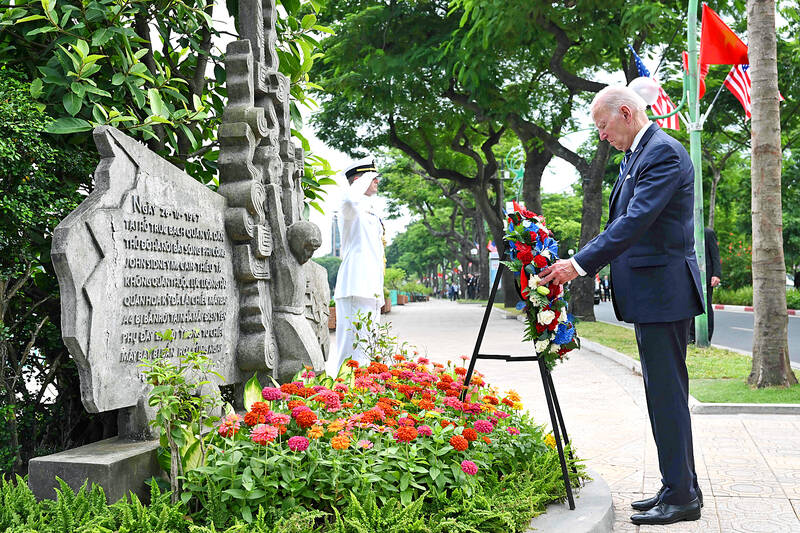US President Joe Biden said China’s recent downturn could diminish any inclination by Beijing to invade Taiwan, adding that the country’s economic troubles have left his Chinese counterpart with “his hands full.”
The US president, who traveled to Vietnam on Sunday following a gathering of the G20 leaders in India, said he had met with Chinese Premier Li Qiang (李強) while at the summit.
Pressed on why he has not met with Chinese President Xi Jinping (習近平) in 10 months, Biden said Xi “has his hands full right now.”

Photo: AFP
Xi opted not to attend the G20 with no explanation given. The two leaders’ next best opportunity to meet would be at the APEC summit in San Francisco in November.
China “has a difficult economic problem right now for a whole range of reasons that relate to international growth and lack thereof, and the policies that China has followed,” Biden said.
“I don’t think it’s going to cause China to invade Taiwan, matter of fact the opposite, probably doesn’t have the same capacity as it had before,” he added on Sunday during a press conference in Hanoi.
The US president also addressed growing tensions between the world’s two largest economies over their technological ambitions.
China is seeking to ban the use of iPhones for state-owned enterprises — representing a blow to Apple Inc and broadening previously announced restrictions that only targeted government agencies. In 2017, the US Congress passed laws restricting certain Pentagon networks from using equipment from Huawei Technologies Co (華為) or ZTE Corp (中興).
“I’m not going to sell China material that would increase their capacity to make more nuclear weapons or engage in defense activities,” Biden said.
Huawei recently quietly revealed a mobile phone utilizing technology the US has sought to keep out of Beijing’s hands, questioning the efficacy of US chip restrictions.
The US Department of Commerce has begun an official probe into the advanced made-in-China chip housed within Huawei’s latest smartphone, although more information is needed to determine how the chip was produced and what, if any, action the US would take in response.
Biden said he had no intention of trying to contain or isolate the world’s second-largest economy.
“I don’t want to contain China, I just want to make sure that we have a relationship with China that is on the up and up, squared away, everybody knows what it’s all about,” he said.

The Taiwanese passport ranked 33rd in a global listing of passports by convenience this month, rising three places from last month’s ranking, but matching its position in January last year. The Henley Passport Index, an international ranking of passports by the number of designations its holder can travel to without a visa, showed that the Taiwan passport enables holders to travel to 139 countries and territories without a visa. Singapore’s passport was ranked the most powerful with visa-free access to 192 destinations out of 227, according to the index published on Tuesday by UK-based migration investment consultancy firm Henley and Partners. Japan’s and

NATIONAL SECURITY THREAT: An official said that Guan Guan’s comments had gone beyond the threshold of free speech, as she advocated for the destruction of the ROC China-born media influencer Guan Guan’s (關關) residency permit has been revoked for repeatedly posting pro-China content that threatens national security, the National Immigration Agency said yesterday. Guan Guan has said many controversial things in her videos posted to Douyin (抖音), including “the red flag will soon be painted all over Taiwan” and “Taiwan is an inseparable part of China,” while expressing hope for expedited “reunification.” The agency received multiple reports alleging that Guan Guan had advocated for armed reunification last year. After investigating, the agency last month issued a notice requiring her to appear and account for her actions. Guan Guan appeared as required,

Japan and the Philippines yesterday signed a defense pact that would allow the tax-free provision of ammunition, fuel, food and other necessities when their forces stage joint training to boost deterrence against China’s growing aggression in the region and to bolster their preparation for natural disasters. Japan has faced increasing political, trade and security tensions with China, which was angered by Japanese Prime Minister Sanae Takaichi’s remark that a Chinese attack on Taiwan would be a survival-threatening situation for Japan, triggering a military response. Japan and the Philippines have also had separate territorial conflicts with Beijing in the East and South China

A strong cold air mass is expected to arrive tonight, bringing a change in weather and a drop in temperature, the Central Weather Administration (CWA) said. The coldest time would be early on Thursday morning, with temperatures in some areas dipping as low as 8°C, it said. Daytime highs yesterday were 22°C to 24°C in northern and eastern Taiwan, and about 25°C to 28°C in the central and southern regions, it said. However, nighttime lows would dip to about 15°C to 16°C in central and northern Taiwan as well as the northeast, and 17°C to 19°C elsewhere, it said. Tropical Storm Nokaen, currently